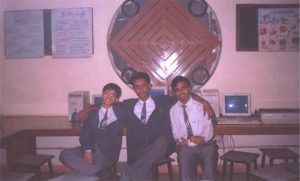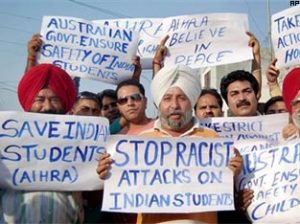White Space is a commonly used term in the industry I work in, the Internet industry. White Space is the space that is left between text and images on a web page. It is often said that the more white space you have, the more prominent your text becomes. For example, Google.com has a lot of white space while Naukri.com has a drought of it….
Looking at life and ourselves, I want to apply the “White Space” principle in our daily lives too. We live in a world where we strive to be busy. Workaholic people, who spend 12-15 hours at the workplace are celebrated like martyrs in our society. Being busy has become a parameter for measuring success. We have filled up our lives with friends, work, projects, dreams, aspirations, and so on. When we pack our calendar from 8AM to 6PM, more often than not we will find no time for lunch, or re-group your desk, or reply to a mail from an old friend…
Applying the “White Space” principle to our lives, we need to realise the two kinds of white space that we find in our lives. One is which we don’t choose. Like time spent when traveling to work, waiting outside the client’s office for a meeting or waiting for your turn in a queue. We get this white space daily in our lives and more often than not we don’t make use of it and just let it go by. The other kind of “White Space” is what we decide to put into our lives. Taking some time off for ourselves just after getting up from bed, taking a few planning breaks in between, or a introspection break at the end of the day will not only help us relax and plan our lives better, it makes room for people and things that really matter.
Coming back to first kind of white space, I always try to make proper of whatever white space I get in my routine. If I am stuck in a traffic jam, I normally take out a book or article (which I always carry) and read some pages. It could be anything from business to jokes. If waiting for somebody for a meeting, I sometime just sit back with my eyes closed for 5 minutes which believe me, can really help focus better afterward. We will always get these unexpected white spaces in our lives daily and rather than being frustrated and honking on the roads, we can take this time to relax and rejuvenate for the rest of the day. Make use of this break by turning it into an energy booster, not an energy drainer.
The second kind of white space comes when you keep a little more breathing time in your calendar. Giving our self even a few minutes of breathing time everyday can make a huge impact in our lives. Begin small. Take 10 minutes out for yourselves every morning. Try to visualize your day ahead and how you plan to go about it. What tasks you want to be over by the end of the day? Or just do some breathing exercises and prepare yourselves for the day. During the day, take time between meetings. Go for a walk, and connect with your body, your breath and nature. It might be difficult at first, but we need to let go of the feeling that everything needs to be done right now. This way of thinking is embedded in our society and is very unproductive.
The point is to slow down and reconnect with yourself. How many times have you been too busy with your day-to-day schedule that you don’t even have time to think what you are doing? Learn to say “NO” to unimportant things, don’t try to “fill” time by doing something, just sit back and relax for a while. Try sometime to put your head in your mother’s lap for 10 minutes and relax. It feels great. Now remember the last time you did this!! Ever since I started taking time out for myself, I am feeling more rejuvenated and fresh. My anxiety and resentment are gone, I know what is happening with my life, and I am able to contribute more to those really close friends and family, as they are the ones who really matter.



